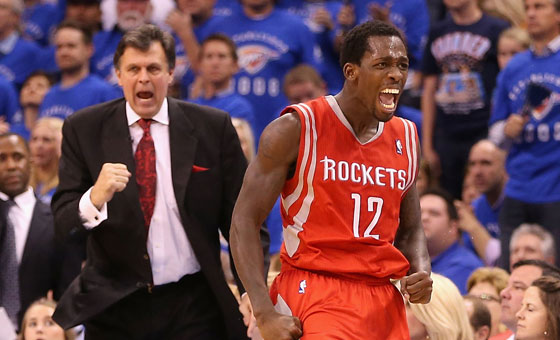Houston Rockets
Despite loss, Rockets come to play in Game 2
Now this was something to build on. The Rockets didn’t leave victorious Wednesday night, falling 105-102 in Game 2, and they come back to Houston in an 0-2 hole, but for the first time in this matchup, the Rockets look like they’re ready to make it a series.
Published
12 years agoon
Now this was something to build on.
The Rockets didn’t leave victorious Wednesday night, falling 105-102 in Game 2, and they come back to Houston in an 0-2 hole, but for the first time in this matchup, the Rockets look like they’re ready to make it a series.
Patrick Bleepin’ Beverley
The Rockets adjusted their starters for this one, taking out Greg Smith and going with a three guard lineup of Patrick Beverley, James Harden and Jeremy Lin.
It paid off, and that’s because of Beverley.
The 6-foot-1 guard, who just four months ago was playing in Russia, got his first NBA start, and oh by the way… it was against one of the league’s elite point guards in a hostile arena in a critical playoff game. He responded with 16 points on 7-13 shooting (2-4 from deep), 12 rebounds (including 5 key offensive boards), 6 assists, 2 steals and a block.
The stats were terrific, but his impact was clearly visible when guarding Russell Westbrook (29 points on 10-26 shooting). You’re not going to stop Westbrook, but you can make it tough on him and get in his head, forcing him to try to do too much to compensate. Beverley did both. I initially thought he was playing like a poor man’s Rajon Rondo, but probably a better comparison for his impact was Clippers guard Eric Bledsoe — a quick, athletic, aggressive guard who goes hard on both ends. I think the TNT broadcaster summed it up best: “Patrick Beverley, how tough are you?!”
I can not see any way Kevin McHale goes away from heavy minutes for Beverley. His impact was the biggest difference between the Game 1 blowout and the Game 2 thriller.
Harden and Lin
James Harden finished with 36 points and he made some tough shots. He couldn’t hit from long range (1-7), but what I liked was that he was more efficient inside the arc (8-17, 47%) and feasted at the free throw line (17-20). This is the straw that stirs the drink and sets the stage for everything else.
I thought starting Beverley and letting him focus on guarding Westbrook was a good move for Lin, who needs to become an offensive weapon if the Rockets are to have any chance in the series. I think Lin played fairly well in the first half (7 points on 3-7 shooting, 3 assists, 4 boards), but he collided with Thabo Sefolosha late in the first half and suffered a muscle contusion in his right chest area and had to sit out the second half (see video).
Three-Pointers Not Falling
At this point, Houston’s early to mid-season dominance from three-point range seems a distant memory. They are hitting 32.4% from distance in their last 19 games and shooting just under 30 of them a night. If compared to season-long numbers, that would be more three-point attempts per game than any other team and at the second worst efficiency (trailing only Minnesota).
Yet, in Game 2, that lowly percentage could have been good enough to win the game. The Rockets were just 10-35 (28.6%) from distance. Simply put, the Rockets can not win this series unless Chandler Parsons (4-15 in the series), Carlos Delfino (5-17), Harden (2-13) and Lin (1-7) start connecting from downtown.
Finding The Open Man
Another big difference between the two games was that the Rockets were moving the ball around trying to find the open man. If they had knocked down a few more threes, they win this game. Period.
A really good play where you can see the Rockets’ good ball movement is with 8:00 left in the second quarter. The ball is thrown to Harden between wing and baseline and he’s immediately doubled by Greg Smith’s man. Derek Fisher leaves Lin to body up Smith and Lin is calling for the ball on the weak side because he’s wide open.
Ball movement saves the day. Harden quickly whips it to Beverley who wastes no time finding Lin. With Fisher quickly trying to recover, Lin pulls the trigger on a three on the bounce and nails it. Both the quick passing and Lin’s lack of hesitation in getting it off are things we didn’t see in Game 1. Far too often, Lin hesitates and lets the defense get set and Houston’s offense has to reboot. That didn’t happen here and it paid off.
Smith’s Struggles
Greg Smith has played a total of 31 minutes in two games in this series and the Rockets have been outscored by 49 points in that time. FORTY-NINE!
His two-minute stretch in the third quarter was disastrous as a tied game became an 11-point Rocket deficit during that stretch when he came in to play center for Omer Asik (9 points, 14 boards).
He watched Westbrook go baseline by him — fouling him on the body — and the speedy guard scored with ease. Three-point play. He miscommunicated with Aaron Brooks on a simple pass and he let it go by him out of bounds. Turnover. And with 3:55 left in the third, we probably saw the biggest demonstration of the problem.
Smith is guarding Kendrick Perkins, who runs up to the three-point line top of the key to set a screen to free Westbrook. Smith’s problem is two-fold: He comes out way too far on the wing and incorrectly reads the direction of the screen. As a result, Perkins hits Chandler Parsons hard with the pick and Westbrook sees daylight. He bursts through an open lane down the middle and cuts through for an easy deuce… and to boot, Smith fouls him by trying to swipe his shoulder from behind.
It’s not all Smith’s fault, but this is a tough one. We’ve always known the Rockets lose a lot when Asik goes out, but Smith has been especially ineffective so far in this series. It will be interesting to see if this opens the door for rookie Terrence Jones.
Little Help, Refs?
I’m not blaming the officials for the outcome here, but there were two calls in this game that really bothered me.
With 1:01 left in the fourth and the Rockets down just one, Sefolosha hit a wide open three-pointer that essentially won this game, but you can clearly see why no one is near him: Kendrick Perkins is playing tug-of-war with Chandler Parsons’ wrist, literally holding him and pulling him in to keep him from closing out on the shooter. The official is standing right there looking at the two of them (see the play).
It reminded me of the 2008 playoffs when Luis Scola was called for an offensive foul on Andrei Kirilenko just as Bobby Jackson hit a three that would have tied the game against the Jazz. That one was against the home team in the final minute and nowhere near as egregious. Perkins should have been called for an offensive foul and the final minute would have been a different game strategically.
To a lesser extent, the technical that was called on Greg Smith in the second quarter for staring down his opponent after a dunk frustrated me because of the timing. That’s a fairly standard call by the book, but it came on the tail end of a two-minute temper tantrum by Russell Westbrook where he was essentially doing the same thing multiple times.
Westbrook was furious that Beverley tried to go for a steal while he was calling timeout with under 6 minutes to go in the second quarter. The OKC guard fell down trying to spin away from it and came up hobbling on his knee while looking over at the Rocket bench. So you knew how Westbrook was going to react. With 5:22 left in the second quarter, Westbrook stares down Beverley, then violently slaps his hand away. With 5:02 left, he stares down Beverley again after scoring a fast break bucket. With 4:47 left after a foul, Westbrook walks up to the Rockets bench and talks trash. With 4:03 left, Westbrook slaps Beverley’s hand away when he tried to help him up.
No technical on any of those plays.
45 seconds later, Greg Smith grabs an offensive board, throws down a dunk on Ibaka and he flexes and stares at him. Out comes the whistle.
Again, if you want to call it, great — but keep it consistent.
Summary
I had forgotten what it was like when your team is in a tight playoff matchup late — your stomach feels like it’s in your throat. This was an intense, exciting game that showed the Rockets have come to play. The Rockets held the Thunder to 15 points fewer than they averaged against Houston in their first four matchups, and the Rockets’ impressive 21-2 run in the fourth quarter, turning a 15-point disadvantage into a 4-point lead in less than six minutes, inspires hope. I expect the Thunder to play better, but the Rockets are capable of much more as well — especially from long distance. Game 3 is going to be a dogfight.
>> Comments
Armed with a bizarre fascination for Mario Elie and a deep love of the Houston Rockets, Dave Hardisty started ClutchFans in 1996 under the pen name “Clutch”.

You may like
Houston Rockets
Looking Back on the Trade for Phoenix’s Draft Picks
Are the Rockets set to cash in on Phoenix’s downfall or could a Suns retool murky the waters?
Published
1 month agoon
March 12, 2025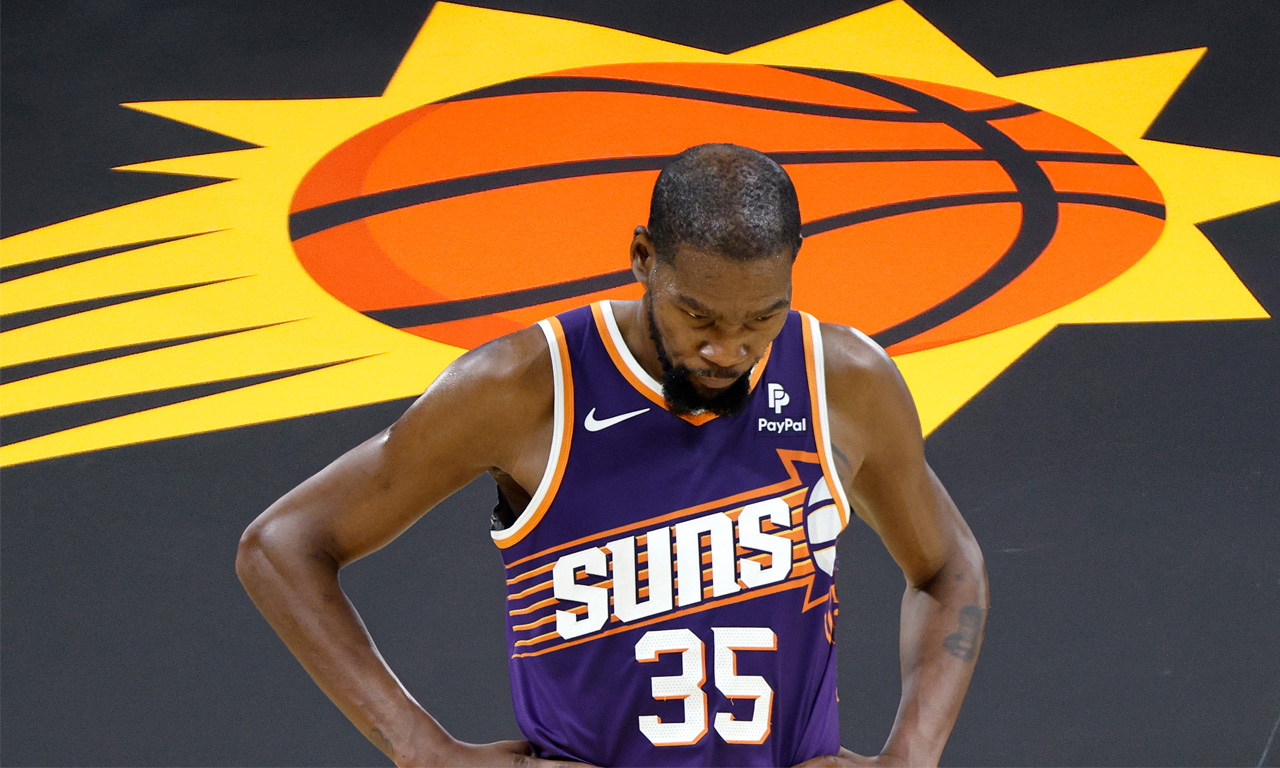
As the Houston Rockets set to host the Phoenix Suns tonight, it seems the right time to take a look back at the trade that linked these two franchises together for the foreseeable future.
This past June, the Rockets made a trade with Brooklyn that sent back to the Nets control of their 2025 and 2026 unprotected first-round picks. In exchange, the Rockets received a large chunk of Phoenix’s future (2025, 2027, 2029) and control of the Dallas Mavericks’ 2029 first.
In essence, the Rockets traded one pick and one swap for two picks and two swaps. All unprotected.
Thoughts At The Time of the Trade
If I’m going to discuss the current outlook of this trade, I have to be honest about how I saw it at the time of the move. While I didn’t hate this trade initially, I definitely didn’t love it either.
I liked that the Rockets increased their overall trade assets. I also liked that they extended the timeline to be able to make a bigger trade and I also appreciated that they kept control of the 2027 Brooklyn swap.
But I didn’t like that the Rockets gave up what seemed like the more established value (Brooklyn) for a more uncertain gamble (Phoenix). The Rockets did not control a “tanking runway” of picks to offer back to Phoenix — all of the picks Houston got in the deal were in staggered years (’25, ’27, ’29). I also felt Brooklyn, who badly needed to rebuild, got away with paying market value to get their picks back despite the fact that the Rockets invested years in watching those picks appreciate up to the point that they had the Nets completely over a barrel.
Net-net: I felt like more certainty was traded for less certainty and it was more of an equitable trade for both teams rather than Brooklyn paying dearly to get back the things only the Rockets could offer.
There were two ways I thought this trade could pay dividends: The Suns needed to flame out immediately, as in this season (unlikely), or the Rockets could trade all those pick assets as part of a deal for a real superstar in the next 12-18 months (more likely).
In a testament to how quickly change can occur in a very unpredictable NBA, four things have happened that have been positive indicators for the Rockets in making this move.
The Suns are fading
While Phoenix had major salary cap issues, dealing with the second apron, they didn’t appear to have problems on the court. They jumped out of the gate 8-1 and looked like a legitimate contender behind their star trio of scorers in Kevin Durant, Devin Booker and Bradley Beal.
Given Houston controlled Phoenix’s pick this year via a swap, it looked like the Rockets would come up empty-handed on the trade this season.
That changed quickly.
Injuries, serious depth concerns and a lack of a defensive identity has sent Phoenix spiraling. Booker’s availability has been inconsistent, forcing Durant to carry the load, while Beal has not quite fit in at all. Their financial limitations, thanks to owner Mat Ishbia’s all-in spending spree, have handcuffed their ability to improve the roster around the three stars.
The Suns are sitting 11th in the West, having gone 22-34 since that hot start, and are currently trying to catch a depleted Dallas squad to get back into the play-in picture.
As of right now, the Rockets project to end up with a lottery pick (albeit a late one) this season out of the trade.
Phoenix was caught shopping Durant
Because the Suns struggled so hard after the start, they tried to make a major move at the deadline but could not unload Beal, in large part due to his no-trade clause.
As a result, they may have made a misstep: They openly tried to trade Durant, which inevitably became public news.
Now? Durant will almost assuredly be traded this summer — likely to a destination that he handpicks. This means the Phoenix Suns will have to look at all possibilities for their future, including potentially having to give Rafael Stone and the Rockets front office a call.
But keep in mind, the Rockets can not offer Phoenix the ability to completely rebuild via the draft right now. Phoenix’s 2026 pick is controlled by Washington. They would have to get extremely creative to set that stage. A retool in Phoenix is much more likely.
Could Brooklyn have been better than expected?
This one is tougher to gauge.
The Brooklyn Nets are currently tied for fifth-worst team in the league, giving them strong lottery odds this summer. This was expected. After all, the Nets, even with a healthy Mikal Bridges and a full roster, were not a good team last season, closing the year 20-41 in the final three quarters of the season. The Rockets ended up with the #3 pick (Reed Sheppard) as a result of Brooklyn’s mediocrity.
However, if the Rockets had not placed that pick back in Brooklyn’s hands, would the Nets be better than this?
Brooklyn brought in a new coach in Jordi Fernandez that has had a positive impact. They have dumped off players, such as Dennis Schroeder and Dorian Finney-Smith, that impacted winning. The bar to make the play-in in the East (.415 winning percentage) is obscenely low, with Brooklyn being just five wins away from it at the moment.
And on top of that, Brooklyn did have lots of draft capital that they could have moved to try to win now.
It’s very tough to say as you don’t know if a team with Bridges still in Brooklyn might have actually been worse than this current squad, but you could make a case that the pick the Rockets would have ended up with from Brooklyn this season would be eerily similar to the one they will end up getting from Phoenix this year.
Again, this is a tough call.
Nico Harrison Hooked the Rockets Up
As part of the trade, the Rockets got control of the Dallas Mavericks’ 2029 first-round pick (unprotected, of course). While there’s really no way of knowing what a pick will be five years out, we did know that Luka Doncic would be just 29-30 years old that season and it was fairly etched in stone that he would be the core piece of a Dallas squad that season.
Enter chaos in Dallas.
Doncic was shipped out in the trade that shocked the world, which could have a major impact on the Rockets. Dallas’ current core of Kyrie Irving and Anthony Davis will be 37 and 36 years old that season, respectively.
On paper, the value of that pick shot up.
Final Summary
Right now, the outlook on these picks looks strong. One source stated off the record that they feel the 2029 Phoenix pick is the best pick asset out there that is owned by another team. The Rockets would be reluctant to add that one specifically into any trade unless it’s for a truly legitimate star.
But if there is any lesson that the NBA teaches us over and over again, it’s that it’s very hard to predict where a team will be a year from now, much less three years from now.
Can the Rockets pressure Phoenix and leverage the ownership they have of their draft capital to get what they really want (Booker) from them? Could a Suns retool around Booker and Beal, with the right pieces and assets acquired from a Durant trade, significantly change their on-court outlook and cap sheet — which in turn could damage the value of the picks Houston controls?
Bottom line is it has worked out well this season, and the future forecast at the moment is promising. The current value of those future picks appears strong. What will likely determine history’s final grade for this trade will be how it sets them up for the trade to come, and that’s where fans will be looking to Stone and the front office for action starting this summer.
Houston Rockets
Amen Thompson’s ankle injury will be re-evaluated in one week
“The things he does you can’t replicate,” says Rockets coach Ime Udoka
Published
1 month agoon
March 10, 2025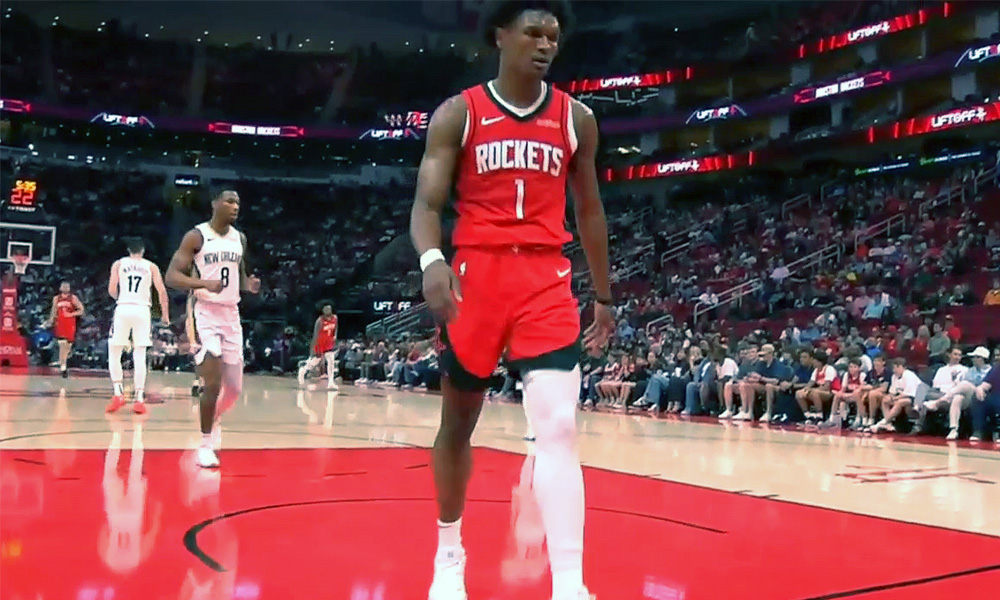
Rockets young star Amen Thompson will have his ankle injury re-evaluated in one week, according to Ime Udoka.
Thompson had an MRI on Sunday and the Rockets coach confirmed all imaging (X-ray, MRI) was negative.
“Just some swelling and pain, obviously,” said Udoka.
If you listen to Udoka, you can tell he knows how special Amen is to this team. He said the Rockets are missing a lot by not having him out there.
“Obviously, the things he does you can’t replicate,” said Udoka. “[Amen is] a guy that plays every position for us. When one goes down, he runs the point. If another is out, he runs the four.”
Amen is one of the best defensive players in the game, and as a one-on-one defender of guards/wings, he might already be the best in the league in just his second season. He’s holding his opponents to 40.5% shooting from the field, tops in the league.
“He’s a very unique defensive player,” said Udoka. “We got some guys that do some great things there, but I like to put him and Dillon on the best two usually, night to night. You got Tari and that’s a luxury as well, but the way he goes about it is different. His athleticism, size, speed, strength, shotblocking ability, steals… he’s all over the place.”
“Hard to replicate for sure.”
Amen injured his ankle late Saturday night in a blowout win against the Pelicans, but the unfortunate part was he probably should not have been on the floor in the first place.
The Rockets left Amen Thompson in the game in a blowout to get one more rebound for a triple-double and he just got injured. He's heading to the locker room with a limp. https://t.co/UBtrEpgWuU pic.twitter.com/D8GeKP8sQk
— ClutchFans (@clutchfans) March 9, 2025
The Rockets had built well over a 30-point lead by early fourth quarter. Jalen Green was able to rest the entire fourth. Alperen Sengun came out of the game with 7-8 minutes left while Dillon Brooks and Tari Eason came out with 6:00 left. But Thompson, who had posted an insane +39 on-off number, remained in the game because he was one rebound shy of a triple-double with 15 points, 11 assists and nine rebounds.
Udoka addressed that decision on Monday before the game against Orlando.
“What I typically don’t do is wholesale substitutions,” said Udoka of the decision to keep Amen in the game. “Albeit 30[-point lead] at six minutes [left] is different than losing to Minnesota, a 16-point lead with four minutes [left].”
“I’ve seen it go both ways in the past. You take out guys too early and have to bring starters back, and vice versa.”
Thompson has played in 60 games this season, five short of being eligible for postseason awards. He absolutely should be up for an All-Defensive nod this season so keep an eye on him getting back in time for that. He would need to return to action no later than April 4th for the game against the OKC Thunder in order to play enough games to be eligible.
Houston Rockets
How the Kyrie Irving Injury Impacts Rockets
Houston’s draft positioning and offseason plans could be impacted by Dallas
Published
2 months agoon
March 4, 2025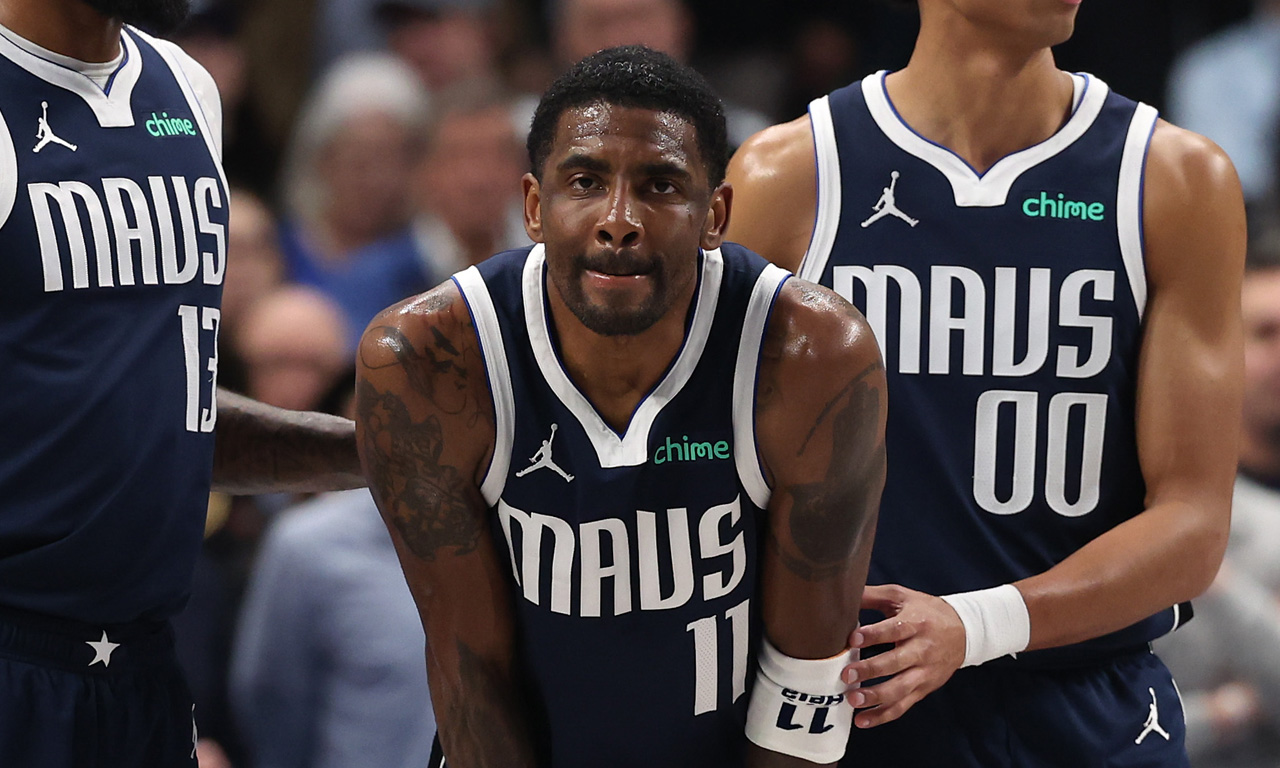
Dallas Mavericks guard Kyrie Irving was injured Monday night and the news dropped on Tuesday that the knee injury is serious — a torn ACL in his left knee that will end his season and a good portion of next season as well.
Brutal. I can’t think of an NBA team that imploded faster than the Dallas Mavericks.
You trade away a 25-year-old phenom who just hoisted you on his back en route to the NBA Finals a year ago. You cashed in that golden ticket to go all-in on a trio of aging stars in Kyrie, Anthony Davis, and Klay Thompson.
Bold strategy, Nico. Let’s see if it pays off.
(Narrator: It’s not paying off.)
The Mavericks had some interesting potential this year and maybe the next couple of years once everyone was healthy, but now? Their star guard is likely out until the calendar year 2026 and Klay and AD aren’t getting any younger nor more durable. The Mavericks may have actually swapped their future for a present that never arrives — and Dallas GM Nico Harrison has to be feeling overwhelming pressure right now.
So how does this impact the Rockets?
For starters, Houston has a game remaining on the schedule against Dallas on March 14th at Toyota Center — Davis may or may not be back for that game.
More importantly, Dallas is the 10th seed in the West at the moment, just 3.5 games ahead of the Phoenix Suns (11th seed). The Rockets control Phoenix’s first-round pick unprotected this season via a swap. We need as many West teams as possible ahead of Phoenix to keep them out of the play-in/playoffs and to push them as deep into the lotto as possible.
This complicates that. Phoenix’s remaining schedule is the toughest in the NBA by a good margin, with plenty of games left against the league’s best teams, so it still looks promising overall — but we’re talking about Kevin Durant, Devin Booker and Bradley Beal. They can still get hot at the right time while Dallas may struggle.
So keep a close eye on that. The good news is the Portland Trail Blazers are one of the hottest teams in the league and they are (shockingly) nipping at the Arizona squad’s heels.
Taking a look ahead to the offseason, the Kevin Durant Pursuit will be big.
This one is a little more complicated for Houston. The Rockets really want Devin Booker but, as of now, the Phoenix plan appears to be to trade KD this offseason and retool around Booker. The Rockets will have interest in Durant but they’re not going to sell the farm (prospects and all the picks) for a 37-year old like they would for Booker.
Three teams that I’ve heard a lot about from Rockets circles that will be in the mix are Houston, Minnesota and Dallas — Timberwolves and Mavericks have been considered the main competition. But, a lot of this will depend on Durant himself and where he wants to play at this stage of his career.
Keep in mind also, if the Suns are “retooling” around Booker and Beal (holding the no-trade clause), then they could be placing a higher priority on win-now players over the return of their own draft assets. The Rockets definitely have the best assets overall to offer up in any trade package between those three teams, but if Phoenix does prefer finding the right ready-to-win players around Booker/Beal, that gives Dallas and Minnesota a real chance.
This injury “may” take Dallas out of the equation, and they are/were definitely a contender for KD’s services given his past relationship with Kyrie and the way Dallas was positioned to win right now. Does KD at his age want to wait for Kyrie to be healthy?
And one last friendly reminder: The Rockets control that Dallas 2029 first (unprotected).
Houston Rockets
Rockets Sign David Roddy to Two-Way Contract
Former first-round pick has played with the Grizzlies, Suns and Hawks
Published
2 months agoon
March 3, 2025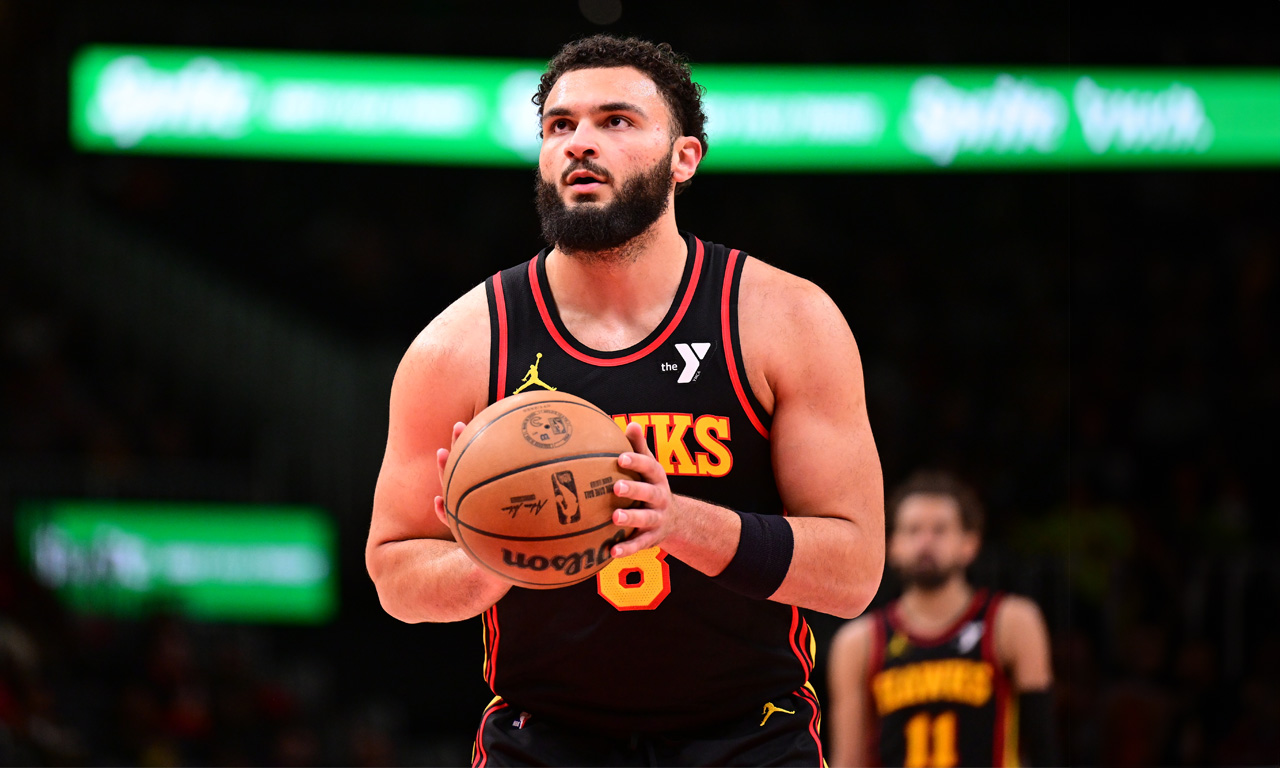
The Rockets made a move on Monday, signing former first-round pick David Roddy to a two-way contract.
The two-way spot opened up after the front office signed Jeenathan Williams to a standard four-year, $8.2 million contract (with friendly team options all along the way).
Roddy is 6-foot-5 and 250+ pounds but sports a 6-foot-11 wingspan. He was taken with the 23rd pick in the first round of the 2022 NBA Draft — six selections after the Rockets drafted Tari Eason. A standout in college, Roddy averaged 19.2 points, 7.5 rebounds, 2.9 assists, 1.2 steals, and 1.1 blocks per game during his junior season at Colorado State.
Roddy, who turns 24 later this month, is a physical player who can play multiple positions. He’s a solid rebounder for his size/position. He has played in 165 games over three seasons with the Grizzlies, Suns, Hawks and most recently Sixers, averaging 6.2 points and 2.9 rebounds per game.
The guard/forward has not shown efficient shooting, however — he’s a career 30.5% three-point shooter and just 68.4% from the line. His defense is better inside than out.
Ultimately, it will be those two things — three-point shooting and defense — that will determine his chances of carving out a consistent role in the league.
All in all, it’s a low-risk signing and the Rockets get a look at a prospect that fits their age timeline.
Houston Rockets
Houston a potential landing spot for Ben Simmons post-buyout?
Published
2 months agoon
February 6, 2025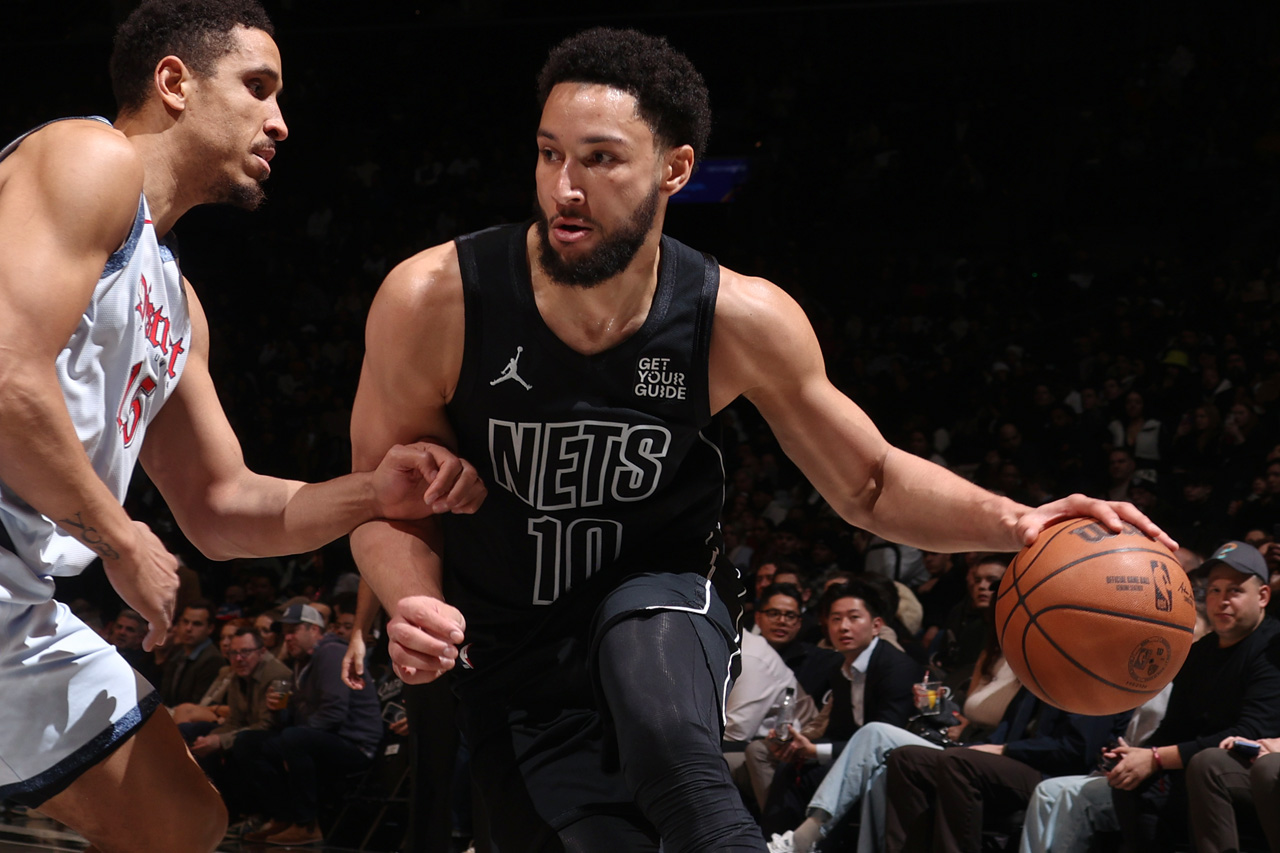
ESPN NBA analyst Brian Windhorst said on Thursday’s NBA Trade Deadline show that Brooklyn Nets forward Ben Simmons is working on a buyout and the Houston Rockets is a potential landing spot for him.
“Cleveland and Houston are two situations for Ben Simmons,” said Windhorst.
Brian Windhorst says the Cavaliers and Rockets are buyout locations for Ben Simmons.
Thoughts? pic.twitter.com/7ly4mvmxr5
— ClutchFans (@clutchfans) February 6, 2025
Advertisement
Rockets coach Ime Udoka was an assistant coach in Philadelphia in 2019-20 when Simmons was with the Sixers, before injuries took a significant toll. In fact, Udoka, when speaking about Amen Thompson earlier this season, brought up some comparisons to Simmons.
“The skill set is there, and it’s something that’s unique with his speed, athleticism, size, passing ability, and all those things,” said Udoka of Thompson. “I coached somebody, Ben Simmons, who had similar traits… as far as size and ability to push the pace, and find guys and finish. There are some similarities there.”
Both Thompson and Simmons are known for their elite athleticism, defensive versatility, and ability to create opportunities in transition.
However, can Simmons help the Rockets today? That’s the tough question.
Simmons has played in 33 games this season, averaging 6.2 points, 6.9 assists, 5.2 rebounds, 0.8 steals and 0.5 blocks in 25 minutes a night. He does not shoot threes (like, at all) — he has only attempted two threes in the past three seasons combined.
Ideally, he does not play in front of your young forwards of Amen, Tari Eason and Jabari Smith Jr. and on that basis alone, I think I would pass. But, Ime loves defensive dogs and he could use some extra ballhandling on the roster. You can see that there’s little in the way of offensive organization when Fred VanVleet is out.
There would be a comical full circle moment though if the Rockets did sign Ben Simmons, considering the Rockets were heavily criticized for trading James Harden in 2021 to Brooklyn instead of to Philadelphia for Simmons. The Rockets clearly made the right choice there.

